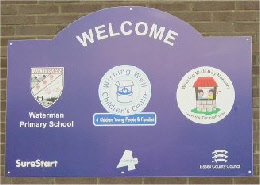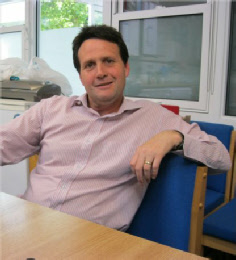

Make a point of visiting us weekly!
Schools
Waterman Primary
Waterman Primary

To return to Waterman’s front page, please
CLICK HERE
CLICK HERE
Waterman Primary School,
The Boulevard, Rochford,
SS4 1QF
Head: Mrs.Welch
01702 546237
www.watermanprimaryschool.ik.org
admin@waterman.essex.sch.uk
admin@waterman.essex.sch.uk
RL: You are one of the two assistant heads. What does that involve?
Bruce: Partly classroom responsibilities, partly curriculum responsibilities, and partly management responsibilities. For example I do the performance management for the teaching assistants and the care-taker, setting new targets and evaluating of the new ones. That has been good because it has given me the chance to get to know the school family better.
RL: This school seems very much to have a family feel about it.
Bruce: I think that was really one of the attractions when I first came: it was the feeling that I got then, and even more so since.
RL: What was it like coming into a school that was in special measures?
Bruce: Well to be honest, I’ve jumped on a lovely band wagon really, because a lot of the hard work had already been done in the previous 12 months. I have just contributed towards what had already been started.
RL: How has maths changed over the years?
Bruce: It’s changed in that I had to almost become untrained and change my thinking to look at the theory behind maths. It’s only that the theory has become more sensible really. I think you’ll find that when we were at school it was a case of problem after problem on the board doing exactly the same, and I have to admit that much of that didn’t make sense to me until secondary school. Now it is the development of strategies to support mental maths for example, and the progression is better planned so you are not doing just the same thing over again, you look at how it develops in Reception and how they see patterns and things.
RL: So what maths do you do in Reception?
Bruce: They can do algebra, which they also do in secondary school. For example if you have three Worms how many more Worms do you need to make five Worms, say? It is only moving the ‘x’ to something else. Obviously you don’t use the language of algebra but the principles and theories are the same, so that when they do eventually get to ‘x’ they realise it is the ‘something’ they had before, and that’s how we do it
RL: Do you still teach them tables?
Bruce: Yes, but again it goes right back down to reception and making sense of it and what does it actually mean? Even with my children in year six when they have difficulties with tables when I started drawing six lots of six as dots or pictures they can then visualise it and I have done a lot this year on visualisation and where we say, “What does that look like?” So when they see six lots of six and they come to divide they can take one lot of six away and another lot of six away. I had done a lot with the ICT and concrete materials as well. There are resources designed for reception which I use in years five and six because those children haven’t seen those patterns so you have to take them right back. This makes the mental concepts easier to grasp.
RL: This is building on in stages
Bruce: Yes, the pattern they should be able to do, for example, should be in year four or year three, but they still haven’t got it in year six and the reason quite often is because we started again but it’s not about starting again, it’s about teaching it a different way, for that particular child as well, so they see it differently. That can be one of the problems, actually, because when you go to teach it again, there is a good reason they didn’t get it the first time, so you have to look back and see if you can teach it a different way.
RL: Do you ever get parents in as groups to teach them the new approaches?
Bruce: That is in the pipeline to do and again it is a case of getting the parents on board. In my last school we had a parent meeting and we showed them how to do division and one mum said, “Oh, that makes sense now.” This is obviously what we’d like to do here sometime, and get the parents more involved. I’m always available to help the parents. Often the homework we send out includes cards or dice games for doing with the families.
RL: I don’t have a problem with my maths but I think I need to come back to school to get a better understanding of it! Bruce, thank you so much; that has been very enlightening.
Bruce: Partly classroom responsibilities, partly curriculum responsibilities, and partly management responsibilities. For example I do the performance management for the teaching assistants and the care-
RL: This school seems very much to have a family feel about it.
Bruce: I think that was really one of the attractions when I first came: it was the feeling that I got then, and even more so since.
RL: What was it like coming into a school that was in special measures?
Bruce: Well to be honest, I’ve jumped on a lovely band wagon really, because a lot of the hard work had already been done in the previous 12 months. I have just contributed towards what had already been started.
RL: How has maths changed over the years?
Bruce: It’s changed in that I had to almost become untrained and change my thinking to look at the theory behind maths. It’s only that the theory has become more sensible really. I think you’ll find that when we were at school it was a case of problem after problem on the board doing exactly the same, and I have to admit that much of that didn’t make sense to me until secondary school. Now it is the development of strategies to support mental maths for example, and the progression is better planned so you are not doing just the same thing over again, you look at how it develops in Reception and how they see patterns and things.
RL: So what maths do you do in Reception?
Bruce: They can do algebra, which they also do in secondary school. For example if you have three Worms how many more Worms do you need to make five Worms, say? It is only moving the ‘x’ to something else. Obviously you don’t use the language of algebra but the principles and theories are the same, so that when they do eventually get to ‘x’ they realise it is the ‘something’ they had before, and that’s how we do it
RL: Do you still teach them tables?
Bruce: Yes, but again it goes right back down to reception and making sense of it and what does it actually mean? Even with my children in year six when they have difficulties with tables when I started drawing six lots of six as dots or pictures they can then visualise it and I have done a lot this year on visualisation and where we say, “What does that look like?” So when they see six lots of six and they come to divide they can take one lot of six away and another lot of six away. I had done a lot with the ICT and concrete materials as well. There are resources designed for reception which I use in years five and six because those children haven’t seen those patterns so you have to take them right back. This makes the mental concepts easier to grasp.
RL: This is building on in stages
Bruce: Yes, the pattern they should be able to do, for example, should be in year four or year three, but they still haven’t got it in year six and the reason quite often is because we started again but it’s not about starting again, it’s about teaching it a different way, for that particular child as well, so they see it differently. That can be one of the problems, actually, because when you go to teach it again, there is a good reason they didn’t get it the first time, so you have to look back and see if you can teach it a different way.
RL: Do you ever get parents in as groups to teach them the new approaches?
Bruce: That is in the pipeline to do and again it is a case of getting the parents on board. In my last school we had a parent meeting and we showed them how to do division and one mum said, “Oh, that makes sense now.” This is obviously what we’d like to do here sometime, and get the parents more involved. I’m always available to help the parents. Often the homework we send out includes cards or dice games for doing with the families.
RL: I don’t have a problem with my maths but I think I need to come back to school to get a better understanding of it! Bruce, thank you so much; that has been very enlightening.

“Meeting an Assistant Head”
Talking with Bruce McMillan, Assistant Head of Waterman School
(9th May 2011)
Talking with Bruce McMillan, Assistant Head of Waterman School
(9th May 2011)
RL: Bruce, you’ve been here since last September I believe, and may I ask what the accent is?
Bruce: Yes, that’s right. And it’s New Zealand.
RL: OK. So, how long have you been over here?
Bruce: My first trip over here was in 1987 and I went back in 1997 and did a three year teaching degree and then taught for three years over there, but my wife and her family come from Essex so we came back. I have one daughter born over there and one born over here in Southend; one is just coming up to 10 and the other is just about to start school. I was just two years working for the local authority as a maths consultant.